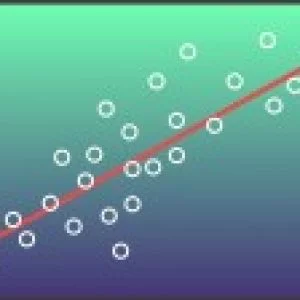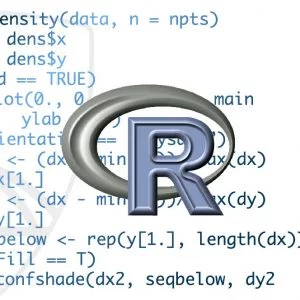
This course covers commonly used statistical inference methods for numerical and categorical data. You will learn how to set up and perform hypothesis tests, interpret p–values, and report the results of your analysis in a way that is interpretable for clients or the public. Using numerous data examples, you will learn to report estimates of quantities in a way that expresses the uncertainty of the quantity of interest. You will be guided through installing and using R and RStudio (free statistical software), and will use this software for lab exercises and a final project. The course introduces practical tools for performing data analysis and explores the fundamental concepts necessary to interpret and report results for both categorical and numerical data Duke University has about 13,000 undergraduate and graduate students and a world–class faculty helping to expand the frontiers of knowledge. The university has a strong commitment to applying knowledge in service to society, both near its North Carolina campus and around the world.
Instructor Details
Courses : 3
Specification: Inferential Statistics
|
53 reviews for Inferential Statistics
Add a review Cancel reply
This site uses Akismet to reduce spam. Learn how your comment data is processed.

FREE







Amit C –
The course is very well explained I had to refer other materials for ANOVA technique to understand it better hence that part can be either improved OR more reference material be provided
priyesh s –
This course is super and explained so well by the professor. I would recommend this course to anyone who has interest in data science
Amarendra S –
Had a great learning experience with in depth knowledge of statistics, inference and hypothesis. Structure of the course helped me grasp things in an organized way. The use of real time data to explain concepts had a great impact in making things easier to understand and relate to things around us.
Richard M –
Generally a great course, but would benefit from a better explanation at times of how to use R effectively.
Chen N –
Much better than the course offered by John Hopkins University on the same subject. Concepts are clearly explained with detailed examples. Nice course to solidify your statistics skills. And BTW, really cute professor 🙂
Akther H –
Excellent course.
Galin D –
Very relevant to modern day needs of a data scientist/statistician. Easy to understand as a relative beginner.
Afzal A –
Expertly designed course, Useful.
Lalu P L –
Awesome Course
Jacob T –
The best online course I have taken so far. It teaches you all the statistical methods you need to do for inference. The lessons are well taught and organized in a way where each lesson builds off the previous. The final project is also a great way to put everything you learned throughout together.
Rui Z –
Professor Mine is terrific. I’m sure she has a great depth of knowledge and grateful that she’s able to deliver her knowledge out to listeners. She uses meaningful examples all along the course, no dry pure mathematical cases at all. That helps a ton to digest concepts. And she constantly repeat some core concepts and how to interpret a statistic right. I didn’t realize how important this was until I was challenged with questions, then I came back and hear again her interpretation, and the whole thing became clearer. She’s one of the best professors I’ve ever listened to, and I’ve been through grad school, met so many professors. The current mentor Rolf was great at supporting. He answers a lot of questions in the forum. He’s very responsible and supportive. So if you’re considering on taking this course, take it now as mentor will change! I haven’t finished the course yet, but the enrollment rate seems to be quite decent, so I wouldn’t expect it to take too long to get final project reviewed and get certificate. I assume this is an important issue for any course takers. The only downside is that there could be more R code teaching, especially on complicated simulations. That way it may be more friendly to R beginners. I know it’s important to do research ourselves for codes, but beginners could lack of proper terminology or vision by nature to do the research on Google. Especially when I’m physically in the Main Land of China, where it takes some efforts to even get on Google, so doing code research took a lot of my time and was a little frustrating towards the end. But again, the overall course and support are great! If this is not a 5 start course, I can hardly give out my highest mark to any other courses. It helped me to understand inferencial statistics, practice R, and think more like a statistician.
Ondina F P –
Very good explained course, with lot of useful exercise, so you can be sure to understand the theory. Th practical examples in R are well designed and explained. This is definitely a must for someone interested in statistics, with beginning concepts that you need to keep in mind for further coursers. The teaches is also excellent, explanation and examples are very good. Recommended!
Natalie R –
Well–taught, but they need to provide more resources to help people learn R. R is not a user–friendly app and I needed to google how to do a lot of the things they’re asking us to do. Needless to say, I can google how to work in R on my own without paying Coursera a fee.
Amruta G –
It’s a great course! Helped me identify and clarify lots of concepts which I had understood just halfway in class.
Diego R G –
A very good introduction to the fundamentals of inference and NHST. It’s very important that you do all excercises and readings or you will not learn as much. Also, the course won’t provide a lot of information on how to use R, but if you spend a good amount of time on your project and make sure that it’s good you will learn enough. I had to review a lot of R projects that were not very good, which suggests that some students aren’t learning what they should. If you want to learn statistics or have limited knowledge on the topic, and also want to learn a bit about how to use R, take the course. If you already know statistics and you only want to learn R, then this might not be the course for you, as the emphasis is on statistics per se.
Ruben D S P –
great class, I improved many Statistics skills and learned R at the same time
schlies –
good course
Evren O –
At times it feels lazy how it is put together. The examples are confusing (rather than clarifying) and there is close to no teaching of R, but the assignments are meant to be done on it. In fact in the forums it is endorsed by mentors to learn R somewhere else. Likewise, I saw one comment where the student mentioned how they got confused by a core concept (p–value) and could finally wrap their head around it by watching a Khan Academy video. And sadly, this was also endorsed by a mentor. Overall, I found the effort put into this course insufficient for people who are new to Statistics or R. Therefore, the name of the entire specialization becomes misleading as it suggests that we were going to be taught how to use R in statistics. I had high hopes for this course but sadly I will abandon it and spend my money on an alternative course/specialization.
Heungbak C –
Very useful and meaningful lectures! I learned many things from this course. Thank you.
Nandkishore –
seeking statistics inference through example in very convenient and easier way
Nandkishore S –
seeking statistics inference through example in very convenient and easier way
Robin M –
Great course, more difficult than the first module. The code was super useful to learn.
David B J –
Very nice job of explaining the material. I love the diverse set of examples used in the lectures and labs.
Harkeerat S T –
Very rigorous coursework. Loved the material.
Daniel H –
An overview of inference, light on the math, light on the theory, and with an unfortunate failure to reinforce what may be the most important part of practice: what should be done when conditions for a particular method are not met. When you teach students how to evaluate the conditions required for certain methods, but then walk through those methods even when the conditions aren’t met, you reinforce poor practice. If you want to use an example where the conditions aren’t met, STOP once you find out the conditions aren’t met. STOP and REINFORCE the fact that you cannot use a method without meeting conditions. It is not a valuable exercise to walk through the plug and chug calculations anyway. STOP, discuss why you can’t proceed, and then move on to another example if you want to give your students an opportunity to practice taking the method through to its conclusion.
Mit P –
Great learning experience. Very well crafted course. Thank you Dr. Rundel and the entire team of instructors!
gerardo r g –
awesome
Eduardo M –
Excellent!
farzad s –
awful!!
Tran T H –
It is very helpful to me.
dumessi –
It is a great course, while some underlying logics are not clearly explained. And the quiz has some unexplained context, which is confused.
fatima s –
Thank you Dr. Mine Cetinkaya–Rundel, you are the best teacher I ever had.
Veliko D –
Amazing course. Perfect balance between theory and practice!
Parab N S –
An excellent course by Professor Rundel on Inferential Statistics.
Majeed K –
An excellent course. Thank you Ms. Rundel
Charlotte C –
This is the second in the series with professor Cetinkaya–Rundel. She explains everything very well and makes the subject fascinating.
Jingyi Y –
No tutor answering questions in the discussion platform.
Hao C –
Teaching: I really like the clear and concise teaching style of lecturer and the wide range of simple real–life example used to explain the course content. I’m a social science student. Although I’ve studied quantitative research methods before, this course gives me some new insights into inferential statistics. I think I will never forget the statistical meaning of p–value after this course! Course Structure: The course structure is well organized with clear focus in each week. The first and second weeks are easy to follow, but the third and fourth weeks are more challenging. Textbook: The textbook used in this course is a good supplementary material, although it is not necessary to read the textbook. Course videos have already explained everything that we need to know at intro level. However, it is worth reading the textbook for the third and fourth weeks. Assessment: The assessment of quiz in each week is relatively easy. The exploratory data analysis required in peer–reviewed assignment is slightly challenging, because it might be hard for beginners to touch every required point.
Giulia T –
Nice follow up from the previous course in the specialisation. The teacher is clear and the main concepts are reminded throughout the course and explained in good depth
Nikhil K –
This course was simply amazing.
Bibek D –
very informative course which was very easy to learn…..
Soumya A –
good learning
Aaron M –
A good course for learning statistical inference, though I found that more than a week per module was required to really absorb the content.
Topon C R –
pesimo
Ghada S –
I think it is a little bit difficult for someone who knows nothing about probability or R.
Amy W –
The course is well designed, and the examples given in each lesson are informative and interesting. For the final project, I wanted to group some categories from one variable together in a new variable, but I did not have the code I needed to do it. It would have been very helpful to have that information in one of the labs prior to doing the final project.
Volodymyr F –
Excellent course! I enjoy the whole Statistics with R specialization.
Nimish B –
Very Informative
Cynthia J J –
This is a wonderful course with a very good instructor. Her explanations and observations are clear, concise and on point. I am so glad I am taking this course because now the mystery of statistics is over for me. I finally understand this logic.
Daniel G P C –
It was good I learned a lot.
John C –
Excellent course to learn about Inferential Statistics and R!
Eduardo B D S –
Great course. I think questions could be harder, but overall I learned a lot, especially with the final project.
Bruno A –
Nice refresher course on inference testing, with a broad coverage of the types of variables / analyses. Not heavy at all on the math side. Students have to find their tips for R coding on the Internet for the most part. It is a good way to learn! But we could use more standard tips from the course itself, especially on EDA.